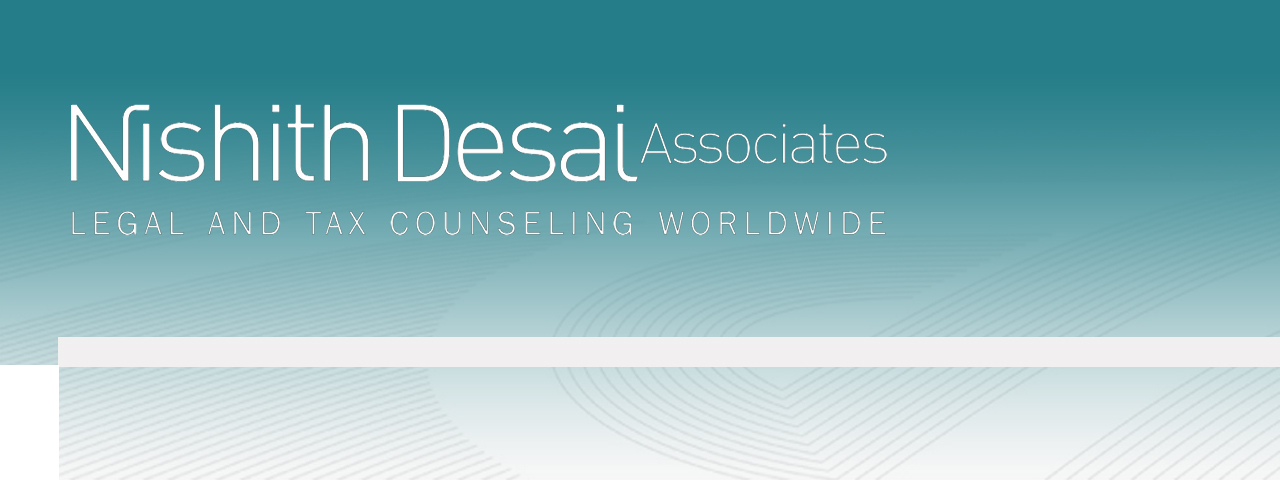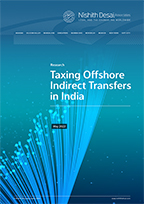Taxing Offshore Indirect Transfers in India
June 16, 2022
Chambers and Partners Asia-Pacific: Band 1 for Employment, Lifesciences, Tax and TMT, 2022 AsiaLaw Asia-Pacific Guide 2022: Ranked ‘Outstanding’ for Media & Entertainment, Technology & Communications, Labor & Employment, Regulatory, Private Equity, Tax Who's Who Legal: Thought Leaders India 2022: Nishith M Desai (Corporate Tax - Advisory, Corporate Tax - Controversy and Private Funds – Formation), Vikram Shroff (Labour & Employment and Pensions & Benefits) and Vyapak Desai (Arbitration) Benchmark Litigation Asia-Pacific: Tier 1 for Tax, Labour and Employment, International Arbitration, Government and Regulatory, 2021 Legal500 Asia-Pacific: Tier 1 for Tax, Data Protection, Labour and Employment, Private Equity and Investment Funds, 2021 IFLR1000: Tier 1 for Private Equity and Tier 2 for Project Development: Telecommunications Networks, 2021 FT Innovative Lawyers Asia Pacific 2019 Awards: NDA ranked 2nd in the Most Innovative Law Firm category (Asia-Pacific Headquartered) RSG-Financial Times: India’s Most Innovative Law Firm 2019, 2017, 2016, 2015, 2014 DisclaimerThe contents of this hotline should not be construed as legal opinion. View detailed disclaimer. |
|

The infamous indirect transfer provisions were introduced under the Indian tax law as a knee jerk reaction to the Supreme Court’s decision in case of Vodafone International Holdings with retroactive effect from April 1, 1962. The indirect transfer provisions have been a source of protracted litigation and tax uncertainty for foreign investors. Pursuant to the introduction of indirect transfer provisions, tax demands were raised in 17 cases, few of which also spurred investment treaty arbitration cases against India. Our research paper on “Taxing Offshore Indirect Transfers in India” is a comprehensive summary of the indirect transfer provisions including the history of its introductions, the amendments made to Indian tax law to provide exemptions and clarifications, compliance and reporting requirements etc. While the retroactivity of the indirect transfer provisions was removed in 2021, not all dust has been settled and there exist quite a few issues with respect applicability of these provisions. In this paper, we have discussed the several issues concerning indirect transfers such as availability of tax treaty exemption, issues for institutional investors, M&A exemptions, interplay with GAAR and impact of these provisions in negotiation of tax indemnities. Further, we have also discussed the approach adopted by OECD, UN and other jurisdictions such as China, Peru etc. for taxing the indirect transfers and issues in resolving tax disputes through investment arbitration. Given that most of the foreign investments in India have been generally made through foreign intermediate entities, assessing the impact of indirect transfer provisions on transactions involving such entities becomes essential. We hope this paper will be useful in providing detailed insight into these provisions. Please click here to access our paper. Please do not hesitate to contact us if you have any queries. For any help or assistance, please email us on ndaconnect@nishithdesai.com. Do visit us at www.nishithdesai.com.
|
Disclaimer
The contents of this hotline should not be construed as legal opinion. View detailed disclaimer.
Research Papers
The Indian Pharmaceutical Industry
Medical Device Industry in India
Compendium of Research Papers
ESG: Prevalence & Relevance |
Research ArticlesArbitration and Exchange Control Laws of India Chambers Global Practice Guide: Gaming Laws The Tips and Traps to Avoid When Investing in India |
NDA ConnectConnect with us at events,
|
NDA Hotline |
Video
Webinar : Non-Fungible Tokens: The Law in India
CNBC Awaaz Crypto Nivesh |



